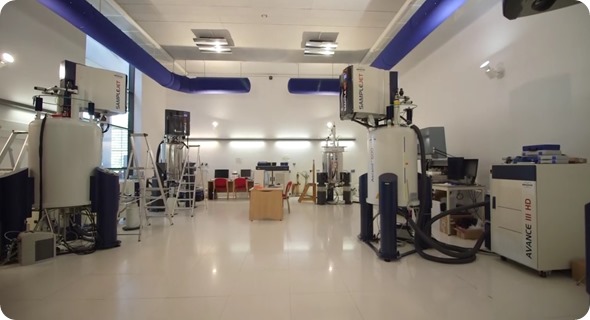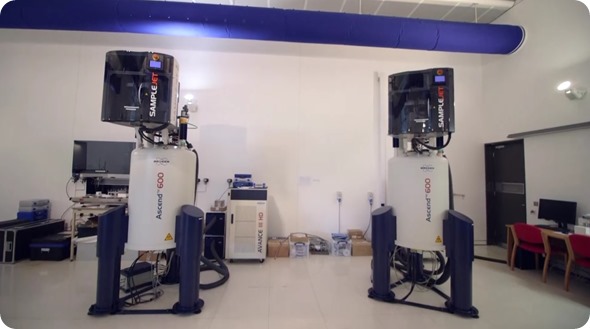
An interview with Dr Iris Mangelschots, Divisional President of Bruker Biospin.
Important Note: the methods and solutions described in this interview are for research use only and not for use in clinical diagnostic procedures.
Please can you give an introduction to the new Phenome Center Birmingham and the larger network?
Bruker has been involved in the Phenome Center network since its beginning. Several years ago, the whole visionary concept of a global phenome network was actually born with Professor Jeremy Nicholson and Bruker BioSpin has been part of it since the early stages.
Opening of the Phenome Center at the University of Birmingham
Opening of the Phenome Center at the University of Birmingham from AZoNetwork on Vimeo.
The Phenome Center Birmingham is a large-scale facility for the metabolic phenotyping of humans and model organisms. It has been funded by an £8 million award from the Medical Research Council and is supplied with state-of-the-art equipment from four scientific instrument companies. The facility has been established as part of a UK stratified medicine initiative and is led by individuals at the University of Birmingham who are internationally recognized for their clinical expertise in metabolomics.
The purpose of the initiative is to understand the mechanisms related to human ageing and the onset and progression of disease, at the molecular level. Another objective is the identification of molecular targets for drug, exercise and dietary intervention. The studies will also aim to identify metabolic markers that could be applied in approaches to stratify the risk of specific diseases developing and to establish who may or may not respond to therapies.
What techniques will be used at the new center?
Nuclear magnetic resonance (NMR) spectroscopy will be used along with eleven ultra-high performance liquid chromatography-mass spectrometers (UHPLC-MS), coupled with automated liquid handling robotics and an advanced computational infrastructure.
Experts from various different fields ranging from experimental design and analytical chemistry through to bioinformatics and statistics will all be working together at the center on all aspects of the project, from conception through to interpretation of the biological information acquired.
NMR in Metabolomics
NMR in Metabolomics from AZoNetwork on Vimeo.
How does metabolic phenotyping differ from genomic phenotyping?
The genome serves as a set of instructions for building the structures and biochemicals in the human body. The genome does not really change throughout life, aside from the small changes that occur as a result of mutations or single nucleotide polymorphisms.
The collection of metabolites in the body as a whole is referred to as the metabolome and is made up of more than 40,000 metabolites. The metabolome can be divided into different tissue-specific or biofluid-specific metabolomes such as the muscle metabolome or the blood metabolome.
The metabolome can be described as the end-stage downstream product that results from gene transcription, with the metabolites serving as precursors in protein, RNA and DNA synthesis, as well as being involved in regulation and signaling pathways.
Unlike the genome, the metabolome is highly dynamic and sensitive to changes in the environment. A person running, for example, would alter the blood and muscle metabolomes, compared to how they were before the person ran. This sensitivity to environmental stimuli is something that can be used to understand disease mechanisms and identify biomarkers that could potentially be applied in the prognosis, diagnosis and treatment of disease.
Please can you give an overview of the Bruker NMR facilities available at the Phenome Center Birmingham?
The Phenome Center Birmingham offers the expertise, advice and capabilities to perform large-scale phenotyping studies of the human population using biofluids such as plasma, serum, urine and cerebrospinal fluid samples, as well as tissue samples and cell lines.
When performing non-targeted metabolomics, which refers to when a broad range of different classes of metabolites are assessed in discovery-based research, the researchers use a combination of state-of-the-art nuclear magnetic resonance (NMR) spectroscopy and high resolution mass spectrometry with ultra-high performance chromatography to generate high quality information that represents thousands of metabolites.

Two of the spectrometers are the AVANCE IVDr platforms provided by Bruker. These are 600 MHz NMR spectrometers, each with a room temperature 5mm probe. NMR spectroscopy is a very promising platform for clinical and diagnostics researchers that enables cost-effective, high-performance NMR clinical screening and IVD research.
How do you envisage Bruker's involvement in the growing international network of phenome centers being created?
Bruker’s NMR spectroscopy systems are already used in over forty clinical research centers globally. They are used in hospitals to perform health-related screening techniques as well as in large-scale human metabolomics studies to generate statistics and identify biomarkers.
Twelve phenome centers globally have already been set up with Bruker as the partner for NMR and the inclusion of Bruker NMR equipment at the Phenome Center Birmingham represents another great milestone.
The role of Bruker BioSpin in this network is obviously to supply NMR capabilities, but moreover, it is about standardizing those capabilities so that all the data are measured in a reproducible way and can be used by any new member of this continuously growing phenome network.
Please can you give an overview of Bruker's partnership with the Phenome Center at Birmingham?
Birmingham will be joining the phenome center network and Bruker will support Birmingham in how the equipment is being used to measure the data and how the samples are prepared according to the standard operating procedures (SOPs).
These SOPs are critical in terms of generating reproducible data, that will be exchangeable and able to be used for clinical research anywhere and at any time. Bruker and Birmingham University will definitely also discuss collaboration in the area of creating content. That, however, still needs to be further developed and we will be training the people who are working in the phenome center.

What's your vision for the partnership between Bruker and the phenome center in Birmingham?
First of all, we are supplying the AVANCE IVDr platform to Birmingham and this is the standardized platform for any phenome center member. Part of this will be to train the people on the SOPs, which are critical in to generating reproducible data that can be used by any member of this global phenome network.
Birmingham can also use the data generated by all the members before they joined the network. Of course, Bruker will continue to support them from a technical and even from an assay perspective.